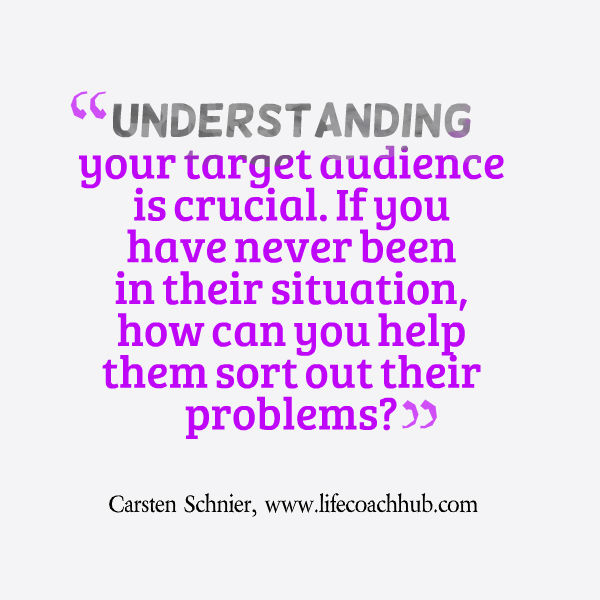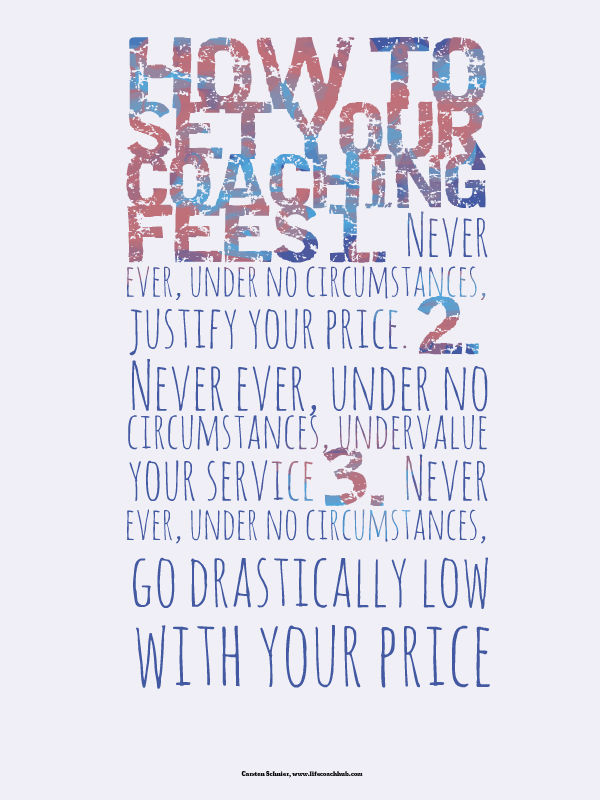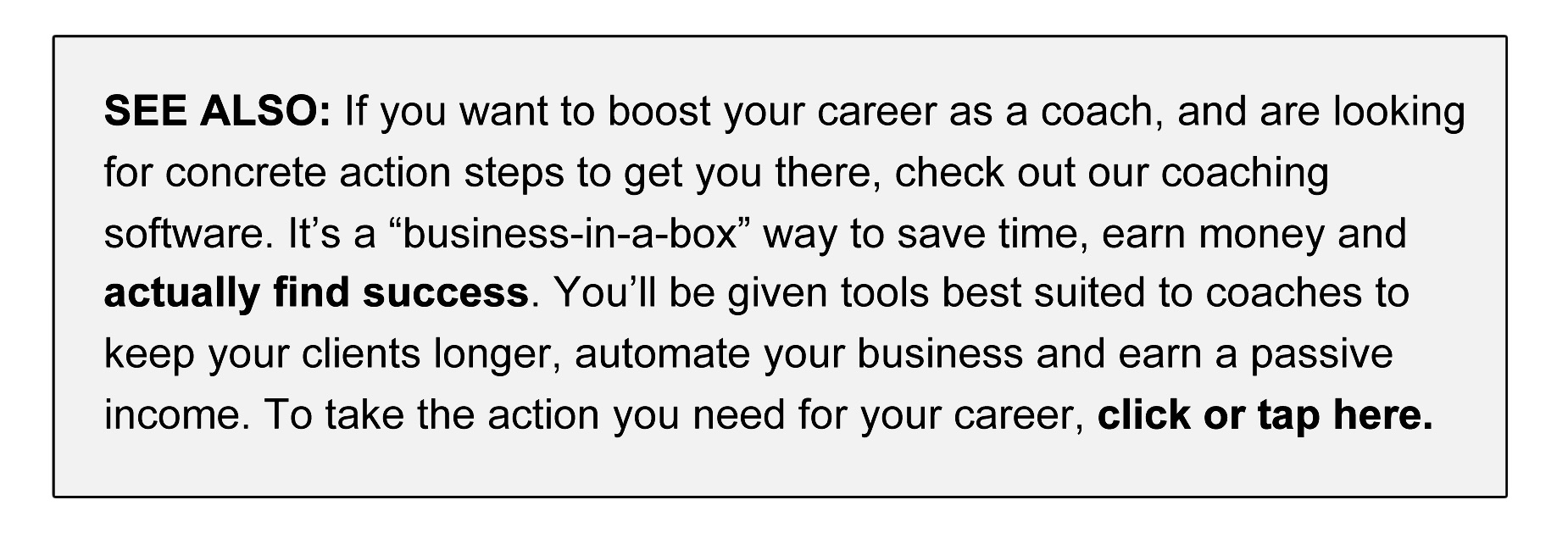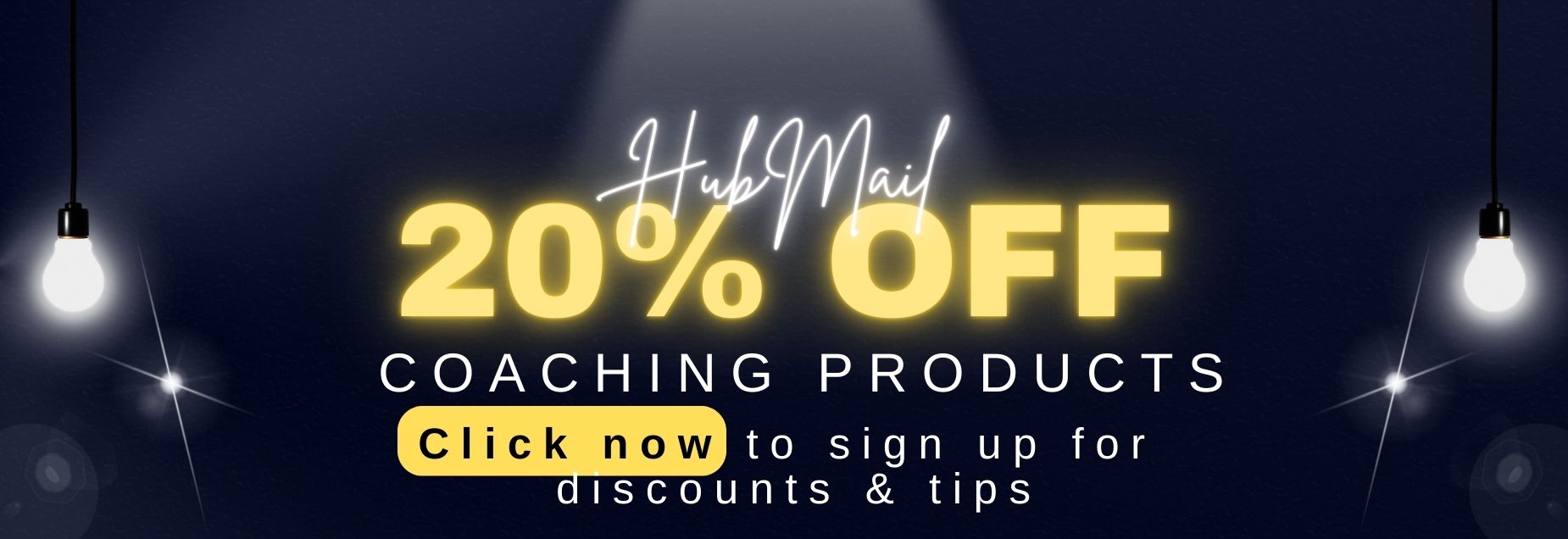
How to set the right FEES for your coaching practice
Pricing has always been a difficult subject in coaching, and there are plenty of things you can do that may actually cause you to set the wrong price for your services.
In my previous article, The truth about building a coaching business, I talked about the downfalls of setting the wrong price. In this article, I would like to elaborate a bit more on what I've said.
In this article I will cover 3 topics that will help you establish how to set your life coaching fees:
-
Knowing your target market
-
Pricing for the graduate coach
-
Pricing for the professional
knowing Your Target Market
While most coaches simply look at what other coaches are charging, they don't really consider their own circumstances. Just because one coach is charging $100 an hour, doesn't mean you should charge the same amount.
You have a lot to consider when you create your pricing and below is a small list of most aspects that you would need to consider:
- Target market
- Business costs (office rent/ telephone, internet, mobile (cell-) phone, travel costs (if you meet in person), webinar costs, hotel room hire, lunch, drinks, coffee/ tea, accountant (if you have one), payment processing costs, electricity a. s. o.
- Employees/ partners (are you working with employees, did you hire somebody? Did you outsource some services such as sales, customer service, marketing, webdesign, SEO etc.
- Time spend to prepare workshops, seminars,
- Marketing costs (digital and offline marketing)
- Are you a member of any business group? (Such as chamber of commerce, networking groups etc.?)
- Personal costs (home rent/ mortgage, telephone, elecricity, food, clothing, water etc.)
- Time spend with a client.
Factoring in the costs
Now write down all the above costs and no matter what the figure is, think how many clients you would need on a monthly basis to pay the “fixed” costs of your business and private life.
If you're running your business as a limited company, then you would need to add your salary/ wage on top of that. Now think about the ideal number of clients that you would like to have. Say, it's 5 a week. No matter what number it is, take your monthly costs and divide it by the number of clients that you are working with. This is the amount your clients need to cover. If your costs are $2000 per month and you are able to get 5 new clients, then you would need to charge a minimum of 400$ per client per month. If you only have one client per month then you either need to charge them at least your actual costs or you would need to start growing your client base.
It really is that black and white. But before you set your fees based on the above, there are a few other things you may want to consider.
Understanding who your customer is
Before you set your final fees it is of the utmost importance to set your target market. For example, if you target unemployed or people on a low income, you can't expect to get paid a few grand for a service that you provide that could help them turn their life around. First of all, you need to understand your audience. Put yourself in their shoes and ask the following questions:
-
Can they actually afford paying you a high amount to overcome whatever it is that you can help them with?
-
On a different note, if you are targeting wealthy people, who could gain a lot from your coaching, would you offer it for a lower rate just to get a name in the business (say when you are just starting out)?
-
Would they see the value if you offered your services for a hundred dollars?

Understanding your target audience is crucial. If you have never been in their situation, how can you help them sort out their life/ business problems? I know what some of you now think. I'm a coach, I don't need to understand my clients, all I need to do is facilitate a meeting, ask the right questions and voila, they will turn their lives around themselves. Even though this might be the case, you still need to create rapport with your clients, you need to show that you understand whatever it is they are going through.
This is what will make you the go to expert in the market.
So, how can you find out who your target audience is? Well, think about it this way, no matter what type of coaching you offer (and most offer all different kinds of coaching all under one roof), which one do you prefer the most? What topic gets you excited? Maybe you like helping others to solve their relationship issues, or maybe you like business coaching, maybe you simply like life coaching or leadership coaching.
No matter what it is, this is your main market area (in this case, market area does not (only) reflect you and your clients location, but mainly the direction you would like to take your business to.
Now drill down further into your target market.
- What types of people do you like dealing with the most?
- For example, lets say you like relationship coaching, but do you prefer working with singles who are looking for love, or do you prefer working with married couples? Married couples can also vary in terms of people who just got married or those who have already been married for a number of years. Another possibility are couples who just got engaged or moved in together.
- Do you prefer business coaching? Perhaps you enjoy talking about HR issues, or organising a business, administration, sales, service etc.
- Any target area can be moved closer to the target market.
Identifying how to reach your customer
- Who do you need to target within your target market?
- Do you need to talk to the husband or wife, the boyfriend or girlfriend, the business owner, CEO or HR? Who is the decision-maker?
- Another question you need to ask, is the decision maker your client or is it somebody else? Especially in the corporate world, you may know the CEO but this doesn't mean they will be making the decision on your services. It could easily be the HR Director, or even a board of directors. There are big misconceptions on corporate sales. Many people believe if they know the CEO, they nearly sold. This is not true at all. The CEO, even though might be the last person signing off on hiring you, is usually not the decisionmaker at all (and that is even if you offer CEO Leadership coaching).
- Targeting personal (private) individuals may result in having to talk to their partner (How many of you have sat in front of a client, pitching your services only to hear that they need to consult their partner? And how many sales did you lose because the partner didn't want to sit down with you or they didn't see the need?) Defining the correct decision maker is part of your target audience analysis.
In order to achieve this, it is important to do the following:
-
What's your area of expertise? What type of coaching do you provide (and enjoy the most)? - e. g. Relationship coaching, life coaching, business coaching, leadership coaching, sales coaching etc. But please only choose one, you can do more if you wish but your main focus should always be one.
Think about it in this way, what do you do with your clients? Let's say you use the GROW or SMART model, you get the client to come up with a number of goals but then you help them drill down on their goals and set priorities and focus on one goal at a time. It's the same in your business.
Always set priorities of what type of coaching you would like to deliver. Keep your focus on this with all your marketing and sales efforts. This doesn't mean you have to tell a client that you can't help them in a different area. You will simply focus your sales and marketing energy towards one “goal.” -
What's your target market? - e. g. Married couples, engaged couples, singles, men, women, teenagers, teachers, council workers, SME's, large corporations, multinationals, IT companies, retailers (you can even define further here, such as electronic retailers, clothing, toys etc.), hotels, restaurants etc.
-
Who's your target audience? - Who is the decision maker? Husband, wife, both, CEO, HR, business owner etc.
I can't say it enough, really drill down on this. Some people may not believe that coaching within a certain niche is good. I'm not saying you shouldn't do any other type of coaching. But in order to attract the right kind of clients, you need to narrow down your search. Focus your marketing and sales activity towards your preferred market and become the go to expert for this audience. It will be worth your while in the end.
Creating the right service program

You need to make a pitch of how you can help them or maybe you even need to prepare a proposal. What's in it for your client? After you've done all of that, you probably went through the advantages of working with you and you may even have given away a free coaching or consultancy session. In the end the ultimate question will arise: How much is that going to cost me?
Answering this question is usually followed by a number of uuuhmms and ohhhms, and maybe a few explanations of justifying the price.
Here is the first rule of engagement (which I am happy to admit, I've done the same mistake before and had to learn this the hard way by losing potential clients):
-
Never ever, under no circumstances, justify your price. If you start justifying your fees, then this simply shows that you are not confident and if you don't feel confident about your own price, how will you establish trust with your client?
-
Never ever, under no circumstances, undervalue your service. If you can solve a problem, then there is a price that needs to be paid for this. No matter how small you believe the problem is.
For some people, the smallest problem could create the biggest challenges. And even though we know how simple the solution is, getting your clients to go the extra mile and solve it requires time, commitment from you and the client and maybe even materials such as worksheets, work books etc.
You may also consider travelling costs, room hire (if for example you offer group coaching), hotel stay if you have to stay longer for your client, drinks such as water, coffee, tea, and last but not least, food. You need to eat and coaching can be very demanding on your body, even if you don't realise it. Also, consider your own coaching (if you don't have a coach, go get one...you can't expect somebody paying for your services if you don't see the need of getting coached yourself. We all need help every now and then or just to keep us focused. Make sure you have somebody who can help you with that.) -
Never ever, under no circumstances, go drastically low with your price. This doesn't mean you can't negotiate with your client, however some coaches would go down to a level, that will not challenge their clients nor will it help pay any bills (trust me, I am speaking from experience.
I had a client who got me to lower my fee by 60% when I started the business, and I needed to pay rent...this helped me for one month paying my rent but my client didn't value the service at all and he didn't commit fully to the programme. It was a painful experience for both of us.)
The way I see it today is this: If I go to the supermarket and buy groceries, I'm not standing at the till and when presented with the final figure of say €100 I say: How about we make it €60? If you want to build in a variable, make sure it's added already to your price. If for example your price is $100 an hour as a minimum then put your price up to $120 so you have room to negotiate with your client. Always add approx. 20% on top of your current fee for negotiation purposes.
If you are confident and you don't want to negotiate, then tell your client this is the final fee. You don't always have to give any discounts. You can also provide value and if your client buys say 4 sessions in advance he gets the 5th one half price. Something like that could provide value and build also loyalty with your clients. In this case they will be back because they want to get that deal. Think long term or future orientated rather than short term.
Setting the right price
But how do you set the correct price? As I said before it all depends on your own target market. You could do some research and see what is the going rate. There is, however, a much easier way to create the right pricing. Now, don't take my word for it, it might not work in your country however you can give it a try or simply adjust as you go along.
As a rule of thumb the best way to calculate your hourly rate is to look at your target market's earnings. (Best to break it down to a monthly figure).
EXAMPLE 1: Low income market
For example, lets say you are targeting people on a low income. Their monthly wage is on average say $1,500. In order to calculate the perfect fee for your client (something that is affordable but also challenging at the same time) multiply it by 3. Take the average working hours from your client for example 40 hours per week. All you have to do now is divide the monthly figure by 4 weeks and divide again by 40 hours. On our example it would look like that:
- Monthly wage: $1,500
- Your full month fee: $4,500
- Work weeks: 4
- Working hours per week: 40
- Your hourly rate: $28.12 (round up to $30)
Granted, this doesn't sound like a lot but if you consider that in this example your target client is a low wage employee, paying you 30$ an hour if they only make roughly $10 is the best solution for both parties. So, best price for your client is 3 times their salary/ wage or 3 times the actual (money) benefit your client will have.
First of all, whatever it is that you can solve for your clients, it's worth some form of payment. So, we can all agree that payment is important.
Lets go back to the unemployed or low wage employees. If you take into consideration social welfare payments, unemployement benefits or the actual hourly wage your client receives from his employer, you could easily charge 3 times the amount.
Now, it may still not be feasible for some people but use this as a general rule of thumb:
- Hourly wage: $10
- Working hours per week: 40
- Making $400 per week gross (depending on country and tax status, say the client keeps $300 for themselves). You could now charge for a small programme $900 or an hourly fee of $30.
Example 2: CEO with 100K/month salary
Lets say your client is a high class CEO making 100K a month. Now your program (depending on what it is) could cost up to 300K. Based on a 40 hour week your client would earn approx. $625 an hour.
Your charge should be around $1,875 an hour. (Just to be clear, this is what you should charge if somebody wants to work with you full days, full weeks and an entire year. This should reflect your annual earnings if you were to work full time with your client).
But why is 3 times the amount feasible? Well, first of all, your client would not hire you to shadow them 24/7. You will meet with them an hour or 2 a week or depending on your own programme and their commitment and availability. In order for the client to gain anything from your programme, they need to respect you, your business and your expertise.
Most people are willing to pay 3 times their hourly rate on services received and feel this is a fair price (sales psychology 101). If you go beyond this price they will go look elsewhere as they feel you overcharge.
In the end you need to be affordable for your client but also at the same time it needs to hurt a little. When it comes to setting your fees, you can learn a lot from your target audience.
Example 3: Start up businesses and SME's
Now, what if you only work with businesses but not necessarily with the CEO? What about start-ups?
The same rule applies; however, it is mainly on their monthly revenue. Noted, not every company will share their revenue figures with you. However, with publicly registered companies it is easy to find out their annual revenue as they all have to prepare an annual report.
With companies just starting out or simply one or two man bands you may need to do some research before. On this note, in order to keep the same type of clients coming to you over and over again, you will need to start set a fee that is reasonable and reflects the annual salary that your ideal clients may have.
Think about it this way. Your target market is SME's that turn over between $50,000 and $150,000. You can now easily set your fee by looking at the type of clients you have worked with before. How much revenue did they make on average?
Let's say the average revenue is 70K, break it down to a monthly figure (on average) $5,800. Your program could now bring easily beyond $16K (if packaged right).
Your hourly fee is now set for approx. $110 and will attract mostly clients who are able to afford this. With fresh start-ups it might be a bit more difficult. You may want to look at what other companies in a similar market are earning and base your fees on that.
For start-ups however I would always urge you to look at their start-up cost and use this as your guide to set your price. If you are targeting coaches for example, the start up cost could be as little as 5K (included here is the coaching training, office set up etc.). Depending on their needs you may want to find a solution that is good for both parties.
A start-up might not have the money to hire you unless you can show them in detail of how you can help them achieve certain results and even if you do, they still might not have the money. There are two things you can do:
-
You can negotiate your fees and add a bonus for certain milestones achieved
-
Simply look at a different target market. Start-ups are difficult to work with and to get. Their priorities are usually not set on coaching but on other things such as building a website, creating their products or services etc.
The only real advice I can give you when it comes to dealing with start up companies is to either stay away from them or make sure you are very, very flexible in your offering.
Example 4: Hollywood clients
With the next example, I would like to go a bit further out. It's very much niche orientated but will help you set the fee for high earning clients (even stars).
Lets just say you want to tap into the Hollywood market. People earning a whopping $50+ Million. How do you set your fees so that it will not only attract this audience but also will help you earn good money? You can't just go and charge $150 Million now for a coaching programme, or can you?
Well, in this case it is about drilling down to your hourly rate and not a package deal. Take the same rule of thumb: 50 Million in earnings, a full years' package could sell for 150 Million (please stay with me on this one – I know exactly how this sounds). Your hourly fee should be around $78K.
This is 3 times of the actual hourly rate of this Hollywood star. If you go in lower, your price will not be respected. If you go in higher, same story.
If you look at tabloids or any articles written about stars you know they spend a fortune on baby clothes, getting a car tuned etc. Your service is no difference. If you don't adjust the price according to your audience, they will simply not buy from you because you are either too cheap or too expensive. Besides, if you go in with 70K, they might just think they're getting a deal.
Example 5: Large corporations
The last topic is large corporations or multinationals. They usually have massive turnover in the region of several hundred million $ a year. Now, in this case you don't take this amount to calculate your programme fees. You need to drill down further.
If you go after multinationals, you don't work with every single employee. Who are you targeting? Maybe it's executives, maybe it's team managers or maybe some of the employees. What would their annual or monthly salary be? It probably depends on the position and department.
If you want to coach the cleaning department, your fees have to be probably much lower than if you offer high class CEO leadership coaching.
Again, your fees should be adjusted to the income of your target audience.

Workshop fees
Workshops are a bit different, but as a minimum you should always charge your hourly rate per person attending.
Basically if your hourly rate is $100, then a full day should be charged around $800. If you allow 10 people in your workshop, then you should be charging a minimum of $80 per person as your fee. Anything on top should cover your bills such as hotel room hire, coffee/ tea/ water/ food but also your workshop material.
If you provide some material, even if it's just a few sheets of paper, remember that you sat down one day to write the content, prepared the exercises and so on. If you now consider everything and say you managed to write your workshop material including a presentation within a full working day that's additional $800 on top of your fee (overall divided by the max. Number of participants). Use this to calculate your clients costs (based on 10 participants):
- Your fee (example): $100 per hour
- Workshop length: 8 hours (1 day)
- Workshop preparation: 8 hours (1 day)
- Hotel room hire: $250
- Water/ coffee/ tea: $5 per person per break (lets say you consider 2x 15 min breaks)
- Lunch: $25
- Workshop material (printing cost): $2 per participant
- Marketing material (if any): $2 per participant (included are flyers, brochures, business cards or even a small gratuity gift – a nice peace of chocolate maybe?)
Calculation:
- $800 (your fee for holding the workshop) + $800 (your fee for preparing the workshop) + $250 (hotel room hire) + $100 (coffee/ tea) + $250 (lunch) + $20 (material) + $20 (marketing material) = $2,240/ 10 participants = $224 fees per attendee.
- Depending on your own cancellation and payment policy you may want to opt this by 30 – 50% to make up for anybody who registered but is not coming or cancelled.
- So, your overall fee should be around $334 per person attending ($110 is your protection). Your protection is also the minimum amount you could charge upfront as a deposit in order to secure the spot for your client.
- Most importantly set a minimum of attendees that you need to cover your costs but also at least some of your fees. Based on this example, you should set the minimum at 3 or 4 people. If you have less signups then it may not be worth your while to hold the workshop considering all the costs you will incur.
One other thing, there are plenty of workshops around for a full day paying 20$ or 40$ or 100$. I would like to say that this might seem like a good way to charge for a workshop, but will not give you any results nor will it provide any results to your audience (unless your audience is unemployed or low wage employees).
The reason is that most people attending your workshop might not even be in your target market. In this case, it is much better for your business to offer this type of workshop for free or a much lower price, make it 2 hours and then fill up the room with 40 or 50 people or more and have an offering ready for a full day workshop at a proper price or to work with you 1 to 1.
If you charge anything less than your hourly rate because you believe it's a workshop and you have more than one person attending, then you need to look at your belief system again, meaning money seems to be a bad thing for you.
I know exactly what you think. If I get 10 people in a room, I make 1,000$, yay me...
- First you make far less (see costing part again).
- Second, your audience will not value the information presented and nothing will change for them afterwards.
- The third point I would like to make is that your audience now has paid for a service and if you make this a full blown sales presentation they will not come back to you but also will tell others of their negative experience with you.
Being confident about your services
Let government or sub-funded institutions provide cheap training. You are in a business to provide excellence, fantastic service and value. Stick to it.
In order to set the right price you need to stop having a relationship with money.
Whatever you think you would spend on any type of services try to apply the same rule for you.
- Look at your current annual revenue, divide it by 12 months, divide it by 4 weeks and divide it again by (for example) 40 hours.
- Then multiply it by 3 and see if you would be willing to pay this amount to any coach or service company to provide you with their incredible service.
- Then take the price and half it or double it.
- Write each amount next to the other.
For example, say your hourly fee is $100. Write it like this:
- Service: Relationship coaching
- Price: $50 - $100 - $200
- Which one would you go for?
Don't think logically, think about your own finances, ability to pay, value etc. The likelihood is that the $50 amount will not give you the results that you are looking for. You may even think that it's quite cheap and what kind of service you could actually expect. The last figure, $200 would probably get you to think this is too expensive. You couldn't afford it. But the middle amount is just right.
Graduate coaches
A graduate coach is somebody who either just finished their coaching training or is about to finish and needs to figure out where to go next from the course to the real world.
A graduate coach is also somebody who has been in the coaching business for less than a year. They are still learning and need to adjust to the market.
I remember when I started with my business as a graduate coach, I simply lacked the confidence in getting anybody to pay me anything. In my first year, I gave away so many freebies simply because I wanted the experience. It did pay off for me after nearly 2 years of being desperately broke, and getting lots of testimonials and referrals. My mistake was that I didn't value my time at all and people took advantage. A conversation usually went somewhat like this:
Client: I would love to hire you and I can see the benefits, but we just don't have the budget at the moment.
Me: How about I do it for free and you provide me with a good testimonial if it works out?
Client: You would do that?
Me: Sure, why not. Lets do this.
I didn't even try to get any money, lowering my fees or even tried to handle any objections. My first priority was to get the client and help them change. Proof to myself and to other businesses in the area that I can really deliver on my service. Basically get a good name in the market.
But this is when it usually started to go all wrong. The first few days/ or weeks were fine but afterwards, people didn't show up to their appointments (even though they confirmed an hour before), they came late and didn't respect my expertise at all.
Now the good thing was that I still managed to help them turn things around and with many, I had great conversations and told them even if they didn't respect me and that they needed to commit in order to see a change happening.
Now, I'm not telling you that you shouldn't charge for your time. I think it all depends again on your target market and how confident you are. The biggest mistake I made was that I didn't get a coach immediately after I graduated. If I did, I would've started charging right from the beginning.
In any case, many graduates believe that they can't charge a lot because of lack of expertise, or lack of experience. This my fellow coaches is a lie that you tell yourself. You have a lot more knowledge than you think. Your clients don't know what coaching is and how it works, so you know already a lot more than your clients do.
If you focus on a niche market, then you already have expertise in this market (I presume) and this is making you the expert. If you know how to solve a certain problem for your client, than this is worth money, a lot of money. So, don't sell yourself cheap.
Be confident and charge what your direct competition would charge. And if I were you, I would increase the price slightly higher. If your comnpetitor charges $100 then you should charge at least $120. Why? This will always put you on top of your competitor. Many businesses make the mistake of decreasing their price because of competition. Now, this is valid if you sell the exact same product and some customers might compare like for like. However, if you add more value to your product, you suddenly become a better fit for your customer.
A simple example:
Two electronic stores sell the same TV: Sony Bravia 42”. In one shop it's $1000 and the other charges $900. Now, for the higher priced seller you also get a TV stand or wall mount, 2 year extended warranty and delivery and installation included while the other retailer only offers you to buy the TV. Which one would you go for?
Unless you already have a TV stand or wall mount that fits, you don't care about the extended warranty and you have a van and can do the installation yourself, you are more inclined to go for the slightly lower priced item, right? However if you talk to both sellers first and then make up your mind, you are more likely to buy the higher priced TV even though it is the same TV.
As a service provider we can always provide more value by simply adding a bit more service, or we have better success rates etc. If you put your price slightly higher than most customers will buy your service because they trust you more than the other. The reason is again in the money. We value something a bit more if we pay slightly more for it and if we receive more value, even better.
You should always be charging as a professional coach because that is exactly who you are.
Professional Coaches
A professional coach is somebody who has been in the industry for a number of years already and has established a name for themselves.
Even professional coaches seem to either undercharge or overcharge for their services. The rule of engagement is exactly the same, look at your target market. If you don't have a target market, start defining it as already outlined in this article.
As a professional coach you need to consider a few more things in your business to establish your price. Look at your current pricing level.
- Are you happy with the price you charge?
- Do you get a good number of clients every month/ quarter/ year?
- Are your clients achieving the results that they want to achieve?
- Did you create a new system or method to help your clients achieve their goals faster?
- What is your success rate?
- How do you stand out from your competitors?
- Do you offer more value?
- What are the differences?
Be confident in your services and pricing. If you don't value yourself, your clients will not value you. Be smart and if your target market doesn't allow you to charge the fees that you would like to have, then it might be time to look into a different market because if you want to charge more, you need to attract clients who can afford paying you.
Don't get me wrong, there is nothing wrong with helping low wage employees or unemployed people and if that is what you would like to do, then you are my absolute hero. But you can't expect to get paid an executive coaching fee from somebody who doesn't even know how to put bread on the table next week.
Adjusting to your target market
I came across a lot of coaches who are charging a fortune for their services but targeting SME's or people who can't really afford their services. One coach told a client of mine that his fee is 10K $ for a 3 month programme and that should help them make a lot of money yet couldn't provide any guarantees. This was not feasible for the client as they were struggling keeping the doors open. His response was if you want to make money you need to spend it. What a twat.
When I came to them, they were nearly beaten. After 10 years in the business, it looked like they are going to close the doors for good. I charged them a fee that was affordable, but also challenging plus a commission once we achieved certain results. If we wouldn't achieve those results no payments had to be made to me. (This challenged me now as well since I wanted to make a nice commission).
After working with them for 1 year they went above and beyond their sales goal and doubled their revenue. Their business grew from 2 people to 8 employees within the 12 month and they finally started to pay themselves an income (which wasn't really there before – only during lucky days). My commission went beyond what I expected, I got plenty of referrals out of this business and I know which coach lost out on this one.
If you want to charge the big bucks, you need to find the right clientele who are able to afford your prices. It is very frustrating for customers if they want to work with you, but can't afford you and you simply tell them if you want to change you will find the money.
A lot of coaches answer this way - must be a coaching thing - but I believe it's all a load of rubbish. You are in the wrong market, mate! This is not helping people, but only devastating them.
Going after the wrong target market will not only have an impact on your bottom line but also creates negative feedback from your potential prospects simply because they think you are far beyond their affordability. And they will tell others about the experience they had with you. Especially if it was negative.
Thank you for reading and my next article will discuss in detail the priorities in business, and how to make sales a priority.
All the best,
Carsten
Want more marketing advice for your growing business? Check out my other articles:
Life Coaching Business Plan: A Quick Template
How to Sell Coaching Services: Selling Coaching is a Must
Get Past the Gatekeeper in Sales
How to Improve Sales: 5 Tips to Improve Your Sales Today
The Truth About Building a Coaching Business
How to Make Your Business Stand Out From the Crowd
Carsten Schnier is the No. 1 Sales Coach in Ireland and helped all his clients to achieve at least doubling their sales revenue within a 12 month period. Carsten works with businesses across different sectors who need to put more focus on sales. From soletraders to SME's up to 100 employees, Carsten is the go to sales coach in Ireland. Carsten is a big believer that sales should be a priority in any business and having the right strategy is the first step to success. Developing a customized sales and marketing strategy will help any business succeed in the long run. Carsten is hands on and he can help any client to achieve the right results as long as commitment is there. He's working with a team of professionals who can help with Time management, branding, building customer loyalty, enhancing customer service, and growing sales. If you want to get in touch with Carsten, please contact him either through his website www.coach-clinic.com or through his profile page on Life Coach Hub. Feel free to connect on LinkedIn as well.




















COMMENTS
Louise Brown.
June 29, 2016Have just come across your articles by accident, a happy accident I must say. Your advice and down to earth approach is really refreshing and I have learnt so much from them.
I am a graduate coach, contemplating starting up on my own and your articles have proven to be just the kind of advice I didn't know I needed.
Thank you so much.
Louise Brown.
Carsten Schnier
July 27, 2016Thank you Louise for your kind comment. I'm glad you enjoy my articles and if I can be of any further assistance, please do not hesitate to reach out. I'm always happy to help a fellow coach out, especially when you are in the start-up phase of your business. I wish you success in your endeavours and please feel free to stay in touch. I would love to hear how you get on especially with implementing some of the advise I've given here. Thank you again and all the best
Carsten
braveheartsacademy@gmail.com
November 11, 2016hi , im sai krishna from india. i m love to coach on the students problems get resolve. i read your article and real story. i learn from you and i correct it now. thank you so much sir.
Mike
January 22, 2018Hello, I am planning on doing a career change, to bring a better income by helping others succeed in their lifes, but could you explain, how many sessions should a 1on1 coach should do with a client, is it a 3-4 month , 1 hr every 2 weeks thing... what is a programmed, how does those work? thank you Carsten great article!
Anja Waler-Ris
April 21, 2018Hi Carsten, it seems the link to your website www.coach-clinic.com as listed at the end of your article doesn´t send us to the right site? Also when I google it, I can´t find it? Some typo in there maybe? Would love to take a look at our website. Thanks. Best wishes, Anja
Anja Waler-Ris
April 21, 2018Would love to take a look at Your website of course... speaking of typos. ;-)
Nick
January 27, 2019Thank you for a great article!